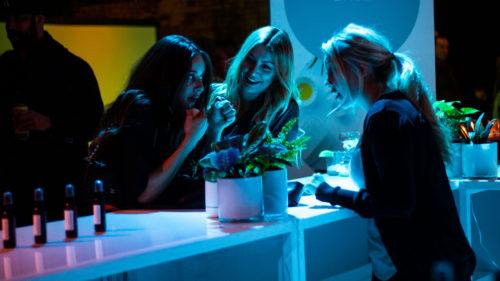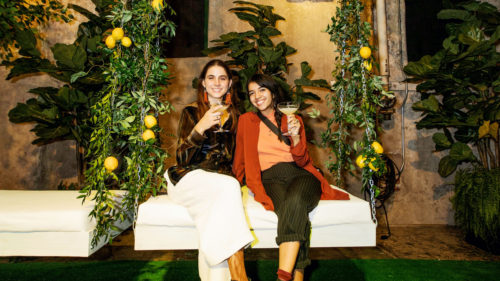By Sarah Krichel
Reporting by Tyler Griffin and Andrea Josic
Neon lights saturated every corner of the event space at 23 Distillery Lane, all serving a different theme meant for a different product line—“Calm,” “Ease,” “Flow,” “Lift” and “Spark.” There wasn’t any weed at the weed event—only themed cocktails. Shortly upon entering, a tray of champagne glasses with a single blackberry in each of them was offered to us. We already felt fancy.
On Oct. 30, myself and two fellow Eye editors attended a Toronto launch party event for licensed cannabis producer Sundial. Sophie Pilon, corporate communications manager of Sundial Growers Inc., told me the Calgary-based company has different brands under its umbrella.
Sundial Cannabis’ mandate is to have a consistent feeling with their strains, as in, users know exactly what to expect with every use. To do that, they use different labels to mark those feelings, such as “Calm” to help a user relax, or “Flow,” to help with concentration and creativity. The line is primarily aimed at novice users.
On top of that, they have a special millennial-focused brand, “Palmetto.” Set to release in early 2020, Pilon describes this brand as “very colourful, very flashy, very cool, very young.”
The purpose of the event was to have a meet-and-greet where the company could thank their partners for all their hard work, celebrate their Ontario launch and introduce media influencers to the brand—hence our invite. Singer-songwriter Delaney Jane was there for a surprise performance to get the party going.
So, why was The Eye, specifically, there? I don’t really know. I received the invitation in my inbox, and while it was initially just the mention of cocktails that sparked my interest, I was curious about the atmosphere of the event. There’s something intriguing about how fancy and high-end the current cannabis industry feels right now, booming in all its legal glory. So, we grabbed our cameras and headed over to the Distillery District on Wednesday night.

But just two cocktails in, we grew tired of the grandeur. It felt like we had just joined the hypocritical fun.
The conversation around cannabis has seen a massive shift over the past year since legalization—but that shift was taking place since way before it was legalized. The stigma around usage started to slowly dissipate as entrepreneur types began reaping the benefits of being able to buy, sell and grow weed. Panel discussions, networking events and publications have popped up everywhere to talk about cannabis in a business sense, making for a new landscape around weed.
I remember the days in high school when the clique of “potheads” were seen to be “never going anywhere in life.” But the stigma and criminalization of cannabis use has contributed much more than just a bad rap for those who reek of weed a couple times a week after school. And it’s Black and Indigenous communities most affected.
“We might have legalized a year ago but we’ve been smoking for 20, 30, 50 [years]”
According to a 2017 Toronto Star analysis, Black people who are without a criminal record were three times more likely to be arrested by Toronto police for possession of small amounts of weed than white people with similar backgrounds. Interviews the Star conducted found that despite little statistical difference between Black and white people’s use of cannabis, the disparity in criminalization comes from Toronto police targeting Black people. Additionally, Black and Indigenous people were overrepresented in possession arrests across Canada, according to a 2018 VICE News report. Ryerson, located in the heart of Toronto, can easily see itself in these statistics.
Legalization is here, but the effects of racial profiling haven’t disappeared. The federal government announced a program allowing Canadians with simple cannabis possession charges to apply for a cost-free, no-wait pardon. Yet Global News reported in September that only 71 Canadians out of the approximate 250,000 with a simple possession charge have applied for the program, and only 44 have been exempted. A Toronto lawyer told Global News that the process is complicated and overly bureaucratic.
According to the Library of Parliament website, cannabis and its derivatives were a Schedule II drug, and the Justice Laws Website says there’s a maximum sentence of five years for that schedule of drug in Canada, as well as a fine of up to $1,000.
“I think the biggest role that we can take as businesses is an educational role”
Historically, cannabis culture has never been on our side. Even the term “marijuana” was used to criminalize people of colour. According to a NowThis video, American prohibitionists in the early 1900s exploited strong racism and xenophobia against Mexican and Black people. Host Alejandro Alba explains that smoking weed didn’t become controversial until after the Mexican Revolution when millions of Mexicans migrated to the U.S. The prohibitionists used the Hispanic term “marijuana” to associate people of colour and “social deviants” with the drug.
Fast forward to our reality in Canada. A year after Oct. 17, 2018, that culture hasn’t just disappeared either.

We decided to interview a few people at the event. When we brought up the culture shift from pre- to post-legalization, one woman, who was white, simply said she had “never thought about it that way.”
But we also bumped into Sam at the event. Sam is the owner of single-day cannabis delivery company Lotus Toronto, who chose to identify with only her first name for legal purposes. She has criticisms against the legal industry for different reasons—so we asked her for her thoughts about the cultural shift of cannabis.
“I live that life on a daily basis. I am a young Indian girl, with a very traditional Indian family that doesn’t necessarily support my passion, which would be cannabis and entrepreneurship,” she said.
Sam works with many medicinal cannabis users. “People still need their needs met. In terms of the product that’s legally out there right now, I know Canada as a whole can do a lot better,” she said, referring to current quality issues with legal products, such as producing large amounts of high quality cannabis, irradiation processes resulting in mould and overall lower quality cannabis. “We might have legalized a year ago but we’ve been smoking for 20, 30, 50 [years].”
Sam emphasized the reception she receives from the work she does. “I had 60-year-old ladies, 70-year-old guys saying, ‘Oh my god, darling, thank you so much for being here. If it wasn’t for you, I would be taking 10 different prescriptions that my doctor has in my medicine cabinet right now.’ And they would hug me with tears in their eyes.”
The night took us beyond just the culture and stigma aspects of the cannabis conversation. When entrepreneurship, business, money, branding and flashy logos are all that’s being talked about, the bigger issues can be overlooked by the government, such as pot possession charges that remain on hundreds of thousands of Canadians’ criminal records, and those who use cannabis to deal with chronic pain.
While companies and businesses, like Sundial, don’t typically comment on the legal and political approaches to the now-allowed plant, it’s important that they, too, remember those who aren’t benefiting from the cute cocktails and new business opportunities. We can’t erase the community of cannabis users who have been there long before it became “normal” and, more importantly, legal.
“I think the biggest role that we can take as businesses is an educational role,” Pilon told me. “Ultimately, that’s what everyone should be doing, and hopefully that’s what all the panels are doing, and all the media that are covering cannabis as well [are doing].”
“But you know what,” Sam added, “the normalization of it, getting rid of the stigma—that’s really important.”
Correction: A previous version of this article stated the “Palmetto” product line was set to release in December.












Kiran
Ick. I’m sorry, but this whole piece wreaks of moral superiority. The first red flag was acting shocked that a white woman “never thought about it that way”….um. Did you guys just ask her to publicly chastise her or did you actually expect a different answer?
Does Canada have a long way to go to rectify unjust incarcerations and marginalization of POC during the prohibition era? Yes. But why does this elicit strong criticisms against a brand launch celebration? Very odd for the reporters to specifically note that this event was to thank partners and introduce media members to the brand, but be confused as to why they were invited. Sure, you can reduce it to “cute cocktails” and be grossed out by the “bougieness,” but the real hypocrisy is going to a high-end event, eating and drinking just like everyone else, only to write an article about how you’re more virtuous than everyone else in attendance.
Whitey
It’s true, white people are alive!